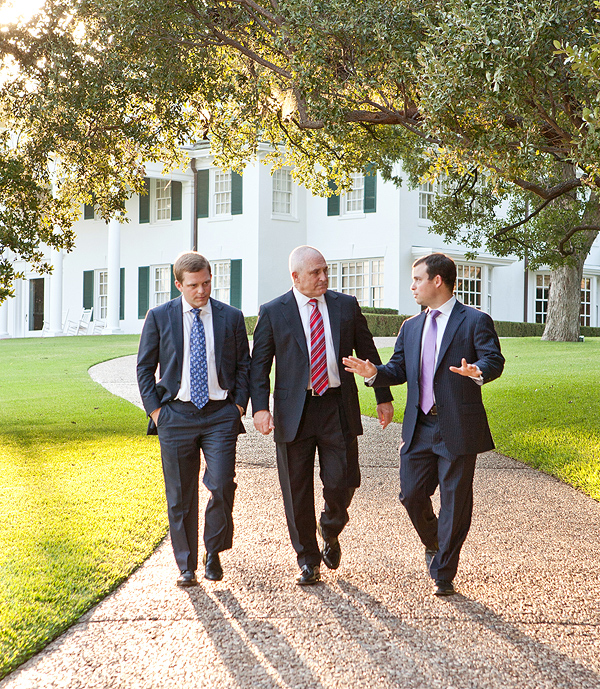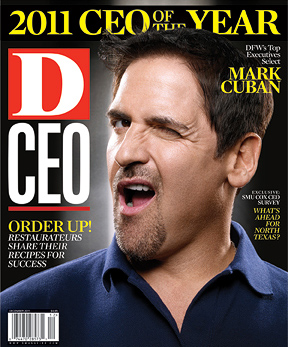John Amend barely has time to settle into his chair for lunch at The Capital Grille before others start coming over to say hello. Name partners of major Dallas law firms, top commercial real estate executives, and one coincidental surprise—Amend’s wife, Teresa, who’s there to have lunch with one of their two sons. She bends over and kisses the top of her husband’s head, a touching gesture that indicates how close the two have grown to become.
Life is good for John Amend. He’s arguably the area’s most powerful tenant representative, running with some of the biggest office deals in Dallas. But getting to this point hasn’t been easy. Although things have stabilized, his 30-year commercial real estate career—and indeed, his life—has been a series of high-highs and low-lows. Early on, he suffered through a bitter business split and a near-divorce. But he also grew a one-person shop into a national, 300-person brokerage and development concern.
Along the way, he made a fortune. So when his largest client filed for bankruptcy in 2002, Amend began to downsize his company and pull back on work. Instead, he figured, he’d travel the world with Teresa and enjoy their iconic mansion on White Rock Lake (Mount Vernon, the former H.L. Hunt estate). And for a while he did just that, handling deals for just a few longtime clients. But then his sons, 31-year-old John William and 29-year-old David (“B.D.”), decided they wanted to get into commercial real estate. It ignited a fire in Amend to regroup and rebuild his firm.
“I have a reason for doing this, and I still love it,” he says. “I don’t want to build another 300-person firm, but a 75- to 100-person organization. … I’ve been doing this for a long time. I’m passionate about it, and I’m good at it.”
Amend sounds confident today, but that wasn’t always the case. Growing up as the son of an alcoholic father, he struggled with self-image issues, despite being a popular athlete at Woodrow Wilson High School in East Dallas. His childhood was painful, and one that involved a couple of significant injuries while under his father’s care. He recovered, and his father eventually sobered up, but Amend’s emotional scars took decades to heal.
Teresa helped. He met her at one of his youngest brother’s baseball games. She was a freshman at Woodrow Wilson; he was a senior. On their first date in 1967, they drove by White Rock Lake and looked up at Mount Vernon and dreamed about owning it one day. After graduating, Amend enrolled at Oklahoma and played football his freshman year as a walk-on. He picked the school because that was where his father had gone. He picked his major, accounting, because his dad recommended it. But after breaking his ankle in spring training, he gave up on football and transferred to the University of Texas at Austin, where Teresa eventually joined him. They married and moved to Dallas after John graduated, and Teresa switched her studies to the University of North Texas. She gave birth to their first child and only daughter, Amy, the same week she earned her degree in education from UNT.
After a “miserable” five years working as an accountant for Arthur Andersen, Amend got a job in the finance department at his father’s employer, Nationwide Acceptance Corp. On the side, he and Teresa sold cookware for the Saladmaster Corp., a company backed by Nationwide Acceptance. Amend found he loved selling—and he was good at it.
Then a chance meeting with a former Sunday School teacher, Trammell Crow executive Don Williams, led Amend, in 1980, to switch to commercial real estate. It took him six months after receiving an offer from Trammell Crow Co. to make the move. “I was afraid of going from a salaried position to a commission position,” Amend says. “And the truth is, Teresa and I needed to sell a lot of cookware to have enough money to take the risk.”
At Trammell Crow Co., Amend was an instant success, leading the nation in suburban office leasing for two years in a row. “All of a sudden, everything just came together,” he says.
He threw himself into his work, soaking up knowledge of the landlord and developer side of the business. Then in 1983, Amend joined former Dallas Cowboys quarterback Roger Staubach as employee No. 3 at his fledgling real estate firm. (The two first met when Staubach was a spokesman for Saladmaster.) Amend was hired on as a development partner, but after a big project fell through, he became a broker by default. “I had a card table and a phone—that’s it,” he says. “And that’s when I found out I was an innovator. I sat back and said, ‘OK. I have to make this work. I don’t belong to Dallas Country Club and I didn’t grow up in Highland Park. On what basis will I compete?’ And that’s when I decided I’d compete on technical competency.”
That epiphany led to a transformation of the firm’s emerging tenant rep platform, Amend says. Rather than just a bunch of one-off brokers, he developed a team approach. “I ultimately hired more than 100 people,” he says. “I quickly found out that I needed a system to ensure quality, and that system was partner, manager, and staff—just like Arthur Andersen. I took the professional services model I was so familiar with and applied it to commercial real estate.”
The approach worked. “They were doing $800,000 when I joined, and $12 million when I left,” Amend says. “I was the technical builder; [Staubach] was the reputation. It was a great combination. But once the nucleus was built, I was out.”
Their skill sets may have aligned, but Staubach and Amend clashed over operational style. Captain America put honor above all else (and still does). Amend, at the time, was win-at-all-costs. Nothing mattered more than winning deals and beating the competition—not his colleagues, friends, or even his family.
“It was having to win in order to feel good about me,” Amend says. “I felt worthless inside and was desperate to keep everybody from knowing that. I thought if I could be a success and win a deal, people would like me and think I was competent. It was like a disease, a drug. I’d win deal after deal, but it never filled me up.”
End-to-End Strategy
Amend launched his own firm in 1988. There, he continued to innovate. With his accounting background and experience on the landlord/developer side of the business, he brought an all-encompassing perspective to tenant representation. He developed what he calls a “program management” system, going beyond just brokering deals to handle every aspect of a client’s real estate needs, from architecture and space-planning to IT. The process helps eliminate efficiencies, he says—and it won him big-name clients.
Growing his company, WorkplaceUSA, and seguing into development was easy; repairing relationships and his fragile marriage was much more difficult. It didn’t happen until after 1991, when Amend says he was saved. “When God changed my life, I began to be able to be trustworthy, to rebuild relationships I had destroyed, relationships that were built on trust,” he says.
WorkplaceUSA’s largest client—comprising about 80 percent of its business—was WorldCom. The company needed millions of square feet of space across the country, and Amend was riding high. His firm was doing so well that, by 2000, he and Teresa made that whimsical high school fantasy of owning Mount Vernon a reality.
But then came the tech and telecom wreck. WorldCom cratered, filing for bankruptcy in 2002. With its business built so solidly around WorldCom, WorkplaceUSA took a big hit, too. After a couple of years of downsizing and dismantling, Amend was left with just a handful of employees, a boutique firm that handled tenant representation for a handful of longtime clients. He rebranded his firm as The Amend
Group to reflect the change and mark a new start.
With more time on his hands, he traveled with Teresa and threw himself into bowling, even developing an upscale alley at his estate. The Amends did a lot of philanthropic work, too, opening up Mount Vernon for fundraisers (which they continue to do, including events that involve their friends, the George W. Bush family).
But something was missing. So a few years ago, when his sons, John William and B.D., expressed an interest in getting involved in the family business, Amend jumped back in with a vengeance.
“I really hadn’t marketed myself as a lease brokerage guy in more than 10 years,” he says. “Suddenly I decided to re-engage. I’ve spent the better part of the last three years building relationships. You don’t get these big assignments by just walking in the door and saying, ‘I’m here!’”
Amend has since secured large office assignments from tenants like Akin Gump, McKool Smith, Baron & Budd, and Fulbright & Jaworski. All told, the firm has five brokers on board and currently is running with about 1.5 million square feet in deals.
With business picking up, Amend earlier this year brought back Executive Vice President Jay Ballou, who had worked at WorkplaceUSA from 1991-2005. The two first met in elementary school, where they were best buds—and sack race partners. “We were undefeated in third through seventh grade,” Ballou says.
Ballou handles day-to-day operations, freeing up Amend to focus on client services and deals.
“I think if people would see how [Amend] manages a transaction, they’d be stunned,” Ballou says. “He’s like a master chess player; he sees so many moves ahead. He will ask questions about a transaction that are five or six moves ahead of where we are now, and he will have already played out in his mind the different scenarios, Plan A versus Plan B, C, and D. “
Between client services and the tutelage of his boys, Amend says he regularly puts in 14- to 16-hour days. He remains fierce about protecting the interests of his clients, but he’s working with property owners, too—a change from his modus operandi of the past.
“Before 1991, I was a win-lose guy,” Amend says. “After 1991, I was on the way to becoming a win-win guy. It really ends up benefiting both sides.”
Amend says his sons share his passion for tenant representation, but that they bring different strengths to The Amend Group. “John William is able to take complex concepts and quickly derive a solution in his mind. He just gets it. He’s predominantly left-brained, analytical,” Amend says. “B.D. is a right-brained person He’s also, quite possibly, the greatest salesman I’ve ever seen. His ability to create and manage a network and build relationships and get information that nobody else seems to get, is remarkable.”
Interviewed separately, John William and B.D. give almost identical assessments of their father (whom they call “John” or “J.T.” at work). Both count him among their “best friends,” and both cite his loyalty, passion for his work, intelligence, and fearlessness.
“If there’s something he’s afraid of, I haven’t found it,” John William says. “When we were on vacation in Hawaii, he jumped off a 65-foot bridge, even though my mom told him not to. He also went hang-gliding over a volcano. He has that same fearlessness in business, too.
When you combine that with his other traits, it’s pretty powerful.”
Although Amend is expanding professionally, he and Teresa are hoping to downsize personally; in October, they put Mount Vernon on the market with a price tag of about $30 million. Managing the estate is a big job, Amend says, and Teresa wants to spend more time on other endeavors.
Besides, the trappings of personal success have never mattered much to him anyway, he says.
“Happiness is not a function of money or power or fame, all of the things the world tells you is important,” he says. “What’s important is that every day when you get up, you can’t wait to get out of bed and do something, no matter what it is.
“Money holds no allure for me; it never has,” Amend says. “I got into this business to avoid desperate boredom. I found something I love, and something that I’m pretty good at. I got lucky.”







